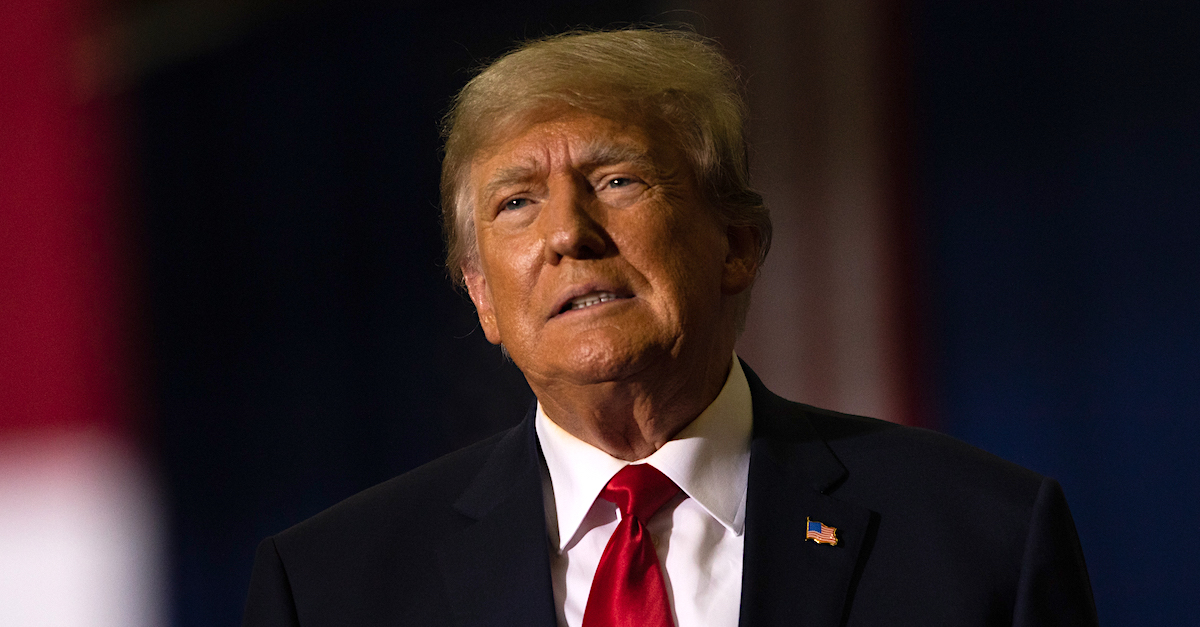
Former President Donald Trump gets ready to speak during a rally on Oct. 1, 2022 in Warren, Michigan. (Photo by Emily Elconin/Getty Images.)
Donald Trump is suing to try to avoid testifying before the Jan. 6 Committee, arguing the separation of powers immunizes a former president from being subpoenaed Congress.
The only possible exception is for testimony related to the House’s impeachment powers, they wrote, which the Jan. 6 Committee’s subpoena does not concern.
“As a result of the Committee’s self-described ‘unprecedented’ action, President Trump has been put in the untenable position of choosing between preserving his rights and the constitutional prerogatives of the Executive Branch, or risking enforcement of the Subpoena issued to him,” according to the 41-page complaint, filed late Friday in the Southern District of Florida’s West Palm Beach Division, which includes Trump’s Mar-a-Lago resort and residence. “Accordingly, Former President Trump turns to the courts to preserve his rights and Executive Branch independence consistently upheld by the courts and endorsed by the Department of Justice.”
Trump’s deposition is currently scheduled for Monday “three calendar days from the date this Complaint was filed, and the Committee has not withdrawn its demand that he appear,” according to the lawsuit, signed by Matthew Seth Sarelson of the Dhillon Law Group Inc. in West Palm Beach.
The complaint seeks a judgment declaring the subpoena and any similar subpoena “invalid, unlawful, and unenforceable because President Trump, as a former President of the United States, has absolute immunity from being compelled to testify before Congress or a committee thereof regarding his actions as head of a co-equal branch of government.”
It says the committee subpoenaed Trump not for a valid legislative purpose but “to embarrass President Trump and to damage his political prospects,” calling the committee’s apparent purposes “political and punitive.”
“That is, the Subpoena seeks exposure for the sake of exposure and is therefore invalid,” the lawsuit reads.
The lawsuit says the subpoena also is too broad, infringes Trump’s First Amendment rights and “is unwarranted because other sources can provide the information the Subpoena seeks.”
It argues the Jan. 6 Committee “effectively lacks minority part representation” after Speaker Nancy Pelosi (D-CA) ignored recommendations from Minority Leader Kevin McCarthy, (R-CA). The committee can only order a deposition after consulting with the ranking minority member of the committee, so the committee can’t lawful order a deposition “nor can it conduct any such deposition according to its own rules.”
The lawsuit was filed about three weeks after the committee voted to subpoena Trump, with Chairman Bennie Thompson (D-MS) saying the former president is “required to answer to those millions of Americans whose votes he wanted to throw out as part of his scheme to remain in power.”
It includes a copy of the subpoena, as well as a Nov. 2 letter Trump’s lawyers sent committee staff “reiterating some of his concerns and seeking clarification on the scope of the Committee’s ‘demands.’”
Trump’s lawyers had discussed the subpoena with committee staff during a phone call a day earlier, according to the lawsuit.
The committee responded by asking Trump on Nov. 4 to “initially focus on two document requests—requests number 1 and 19—which the Committee narrowed, and that he respond to those requests by November 9, 2022,” the lawsuit says. The letter begins by telling Trump’s lawyers that their approach on Trump’s behalf “appears to be a delay tactic.”
“Moreover, we do not see any basis in the letter for Mr. Trump to withhold the beginning of his production,” the letter reads.
“The Committee did not disclaim or withdraw its other sweeping document requests or substantively answer any of President Trump’s concerns regarding the scope and authority for the Subpoena,” according to the lawsuit.
Trump’s lawyers responded on Nov. 9 by saying the former president had “voluntarily directed a reasonable search for documents in his possession. The search found no documents responsive to this request.”
“Consistent with the constitutional separation of powers and the learned opinion of the Department of Justice, as stated for the past fifty years and reiterated just this past September, President Trump asserted his absolute immunity from compelled testimony before Congress regarding his actions while serving as President,” the lawsuit continues.
Trump “offered to consider responding in writing to specific written questions submitted to him by the Committee” but the committee has not replied to his letter “other than to acknowledge receiving it,” the lawsuit says.
Regardless of its merit, the lawsuit is on track to delay matters long enough for the Jan. 6 Committee to expire.
(Image: photo by Emily Elconin/Getty Images.)